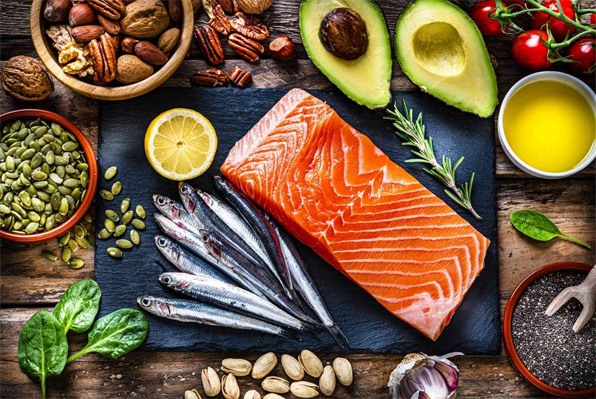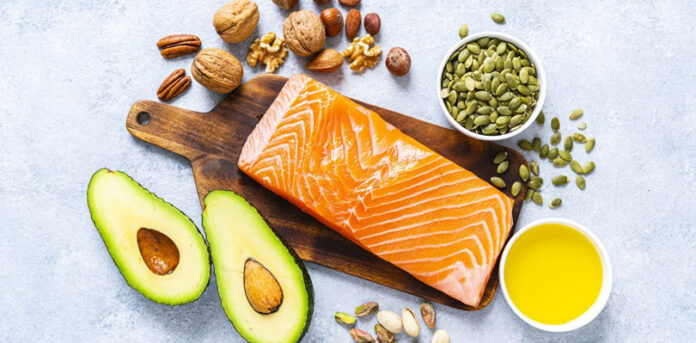Are you tired of hearing about the latest fad diets and conflicting information on what’s truly healthy for your body? Look no further! In this comprehensive blog post, we unveil the secret to a well-rounded and nourishing diet: healthy fats. These powerhouse nutrients are not only essential for our overall health, but they also come with a host of incredible benefits.
Join us as we delve into the world of healthy fats, unraveling their mysteries and shedding light on the most effective sources. From avocados and nuts to olive oil and fatty fish, we’ll explore the rich array of options available to you. Discover how these healthy fats can boost your brain function, promote heart health, and even assist in weight management.
Say goodbye to the days of fat phobia and embrace the knowledge that not all fats are created equal. We’ll guide you through everything you need to know about incorporating the best healthy fats into your daily meals, ensuring you have the tools to make informed choices for a vibrant, well-balanced lifestyle. Get ready to transform your understanding of fats and unlock a world of delicious possibilities!
What Are Healthy Fats
Healthy fats, also known as good fats or unsaturated fats, are an essential component of a balanced diet. Unlike unhealthy saturated and trans fats, healthy fats offer numerous health benefits and play a crucial role in maintaining overall well-being. These fats are found in various plant-based foods, such as avocados, nuts, seeds, and vegetable oils, as well as in fatty fish like salmon and trout.
Furthermore, rich in omega-3 and omega-6 fatty acids, healthy fats support brain function, promote heart health, reduce inflammation, and aid in the absorption of fat-soluble vitamins. Incorporating these nutritious fats into your meals can help you achieve optimal health and vitality.
Foods With Healthy Fats

Avocado
Avocados are packed with monounsaturated fats, which help reduce bad cholesterol levels and increase good cholesterol levels. These healthy fats also promote satiety, making you feel fuller for longer and aiding in weight management. Additionally, avocados provide essential vitamins, minerals, and fiber, supporting digestion and overall immune function.
Olive Oil
Olive oil is rich in monounsaturated fats, particularly oleic acid, which has been linked to numerous health benefits. Consuming olive oil regularly can reduce the risk of heart disease, lower blood pressure, and improve insulin sensitivity. It also contains powerful antioxidants that protect against inflammation and oxidative stress.
Salmon
Fatty fish like salmon are excellent sources of omega-3 fatty acids, particularly EPA and DHA. These essential fats have been shown to reduce the risk of heart disease, improve brain health, and alleviate inflammation in the body. Consuming salmon regularly is associated with a lower incidence of depression, improved cognitive function, and better overall cardiovascular health.
Chia Seeds
Chia seeds are a plant-based source of healthy fats, primarily omega-3 fatty acids. These tiny seeds also provide fiber, antioxidants, and minerals such as calcium and magnesium. Omega-3 fats in chia seeds support brain function, reduce inflammation, and aid in maintaining healthy cholesterol levels.
Walnuts
Walnuts are a powerhouse of omega-3 fatty acids, antioxidants, and fiber. Regular consumption of walnuts has been associated with improved heart health, reduced inflammation, and enhanced brain function. They are also rich in polyphenols, which have anti-inflammatory and neuroprotective properties.
Almonds
Almonds are rich in monounsaturated fats, fiber, and vitamin E. These fats have been linked to improved heart health by reducing bad cholesterol levels and decreasing the risk of cardiovascular diseases. Almonds also provide important minerals like magnesium and potassium, supporting bone health and blood pressure regulation.
Flaxseeds
Flaxseeds are another plant-based source of omega-3 fatty acids, specifically alpha-linolenic acid (ALA). These fats contribute to heart health by reducing inflammation, improving blood vessel function, and maintaining proper cholesterol levels. Flaxseeds also contain lignans, which have antioxidant and hormone-balancing properties.
Coconut Oil
Although it is high in saturated fat, coconut oil is unique because it consists of medium-chain triglycerides (MCTs). MCTs are metabolized differently in the body, providing a quick source of energy and potentially aiding in weight management. Additionally, coconut oil contains lauric acid, which has antimicrobial and immune-boosting properties.
Dark Chocolate
Dark chocolate with a high cocoa content contains healthy fats, particularly monounsaturated fats. These fats, combined with the antioxidants present in dark chocolate, have been associated with improved heart health, lower blood pressure, and enhanced mood. However, it’s important to consume dark chocolate in moderation due to its calorie content.
Incorporating these foods into your diet can provide a range of health benefits, including improved heart health, brain function, inflammation reduction, and better overall well-being.
Benefits Of Eating Healthy Fats
Heart Health
Consuming healthy fats, such as those found in avocados, olive oil, and fatty fish, can have a positive impact on heart health. These fats help to reduce levels of bad cholesterol (LDL) while increasing levels of good cholesterol (HDL). This balance contributes to improved cardiovascular function and a decreased risk of heart disease.
Brain Function
The omega-3 fatty acids present in foods like salmon, chia seeds, and walnuts are crucial for optimal brain function. These fats support cognitive abilities, memory, and learning. They also help in reducing the risk of age-related cognitive decline and conditions like Alzheimer’s disease.
Inflammation Reduction
Healthy fats, especially omega-3 fatty acids, possess anti-inflammatory properties. They help to regulate the body’s inflammatory response and can alleviate symptoms of chronic inflammation, such as joint pain and stiffness. Foods like flaxseeds and fatty fish are excellent sources of these anti-inflammatory fats.
Weight Management
Contrary to popular belief, incorporating healthy fats into your diet can actually aid in weight management. These fats contribute to satiety and help to control hunger, reducing the likelihood of overeating. Healthy fats also regulate blood sugar levels and promote stable energy levels throughout the day.
Nutrient Absorption
Certain vitamins and minerals are fat-soluble, meaning they require fats to be properly absorbed and utilized by the body. Healthy fats, such as those found in olive oil, avocado, and nuts, help to enhance the absorption of these essential nutrients, including vitamins A, D, E, and K.
Skin Health
Healthy fats play a vital role in maintaining glowing skin. They help to nourish and moisturize the skin from within, promoting a youthful and radiant complexion. The omega-3 fatty acids found in foods like chia seeds and fatty fish can also help to reduce inflammation-related skin conditions, such as acne and eczema.
Hormone Regulation
Healthy fats are involved in hormone production and regulation. They serve as building blocks for hormone production and help maintain hormone balance in the body. This is particularly important for women, as adequate healthy fat consumption can support menstrual health and reduce hormonal imbalances.
By incorporating these healthy fats into your diet, you can reap a multitude of benefits, ranging from improved heart health and brain function to reduced inflammation and enhanced overall well-being.
Tips And Techniques To Get Healthy Fats Into Your Body
Include Healthy Fats In Your Meals
Make a conscious effort to incorporate healthy fats into your daily meals. Add sliced avocado to your salads, spread nut butter on whole grain toast, drizzle olive oil over roasted vegetables, or include a serving of fatty fish like salmon or mackerel in your main course.
Snack On Nuts And Seeds
Keep a stash of nuts and seeds handy for a nutritious and convenient snack. Almonds, walnuts, chia seeds, and flaxseeds are all excellent sources of healthy fats. Enjoy a handful of mixed nuts or sprinkle chia seeds on top of yogurt or smoothies for an added healthy fat boost.
Swap Unhealthy Fats For Healthy Alternatives
Replace unhealthy fats, such as butter or margarine, with healthier alternatives. Use extra virgin olive oil or avocado oil for cooking and salad dressings. Swap out processed snacks and baked goods with homemade versions that use healthier fats like coconut oil or nut butter.
Enjoy Fatty Fish Regularly
Aim to include fatty fish in your diet at least twice a week. Salmon, trout, sardines, and mackerel are all rich sources of omega-3 fatty acids. Grilling, baking, or steaming these fish can help retain their healthy fat content while keeping the preparation method nutritious.
Experiment With Healthy Fat-Rich Recipes
Explore recipes that emphasize the use of healthy fats. Look for dishes that key ingredients include avocados, nuts, seeds, or oils. Try making avocado-based dips, homemade nut granola bars, or roasted vegetables tossed in olive oil for a delicious and nutritious way to increase your healthy fat intake.
Remember, moderation is key even when it comes to healthy fats, as they are calorie-dense. Be mindful of portion sizes and balance your fat intake with other essential nutrients to maintain a well-rounded diet.
FAQs
Can I Consume Healthy Fats If I’m Trying To Lose Weight?
Absolutely! Incorporating healthy fats into your diet can actually support weight loss. Healthy fat contributes to satiety, helping you feel fuller for longer and reducing cravings. They also provide essential nutrients that support overall health and can help regulate blood sugar levels. However, it’s important to consume healthy fat in moderation and consider your overall calorie intake to achieve weight loss goals.
Are All Fats Labeled As Healthy Fats Good For Me?
While healthy fats offer numerous benefits, it’s important to differentiate between various types of fats. Healthy fat, such as monounsaturated and polyunsaturated fats found in avocados, nuts, and fatty fish, are beneficial for your health. On the other hand, saturated fats (found in high amounts in red meat and full-fat dairy products) and trans fats (often found in processed foods) should be limited or avoided as they can increase the risk of heart disease and other health issues.
Can I Obtain Enough Healthy Fats From A Vegetarian Or Vegan Diet?
Yes, it’s possible to get sufficient healthy fats from a vegetarian or vegan diet. Plant-based sources like avocados, nuts, seeds, and oils (such as olive oil or coconut oil) provide ample amounts of healthy fat. Additionally, incorporating omega-3-rich foods like chia seeds, flaxseeds, and seaweed can help meet your nutritional needs. It’s important to focus on a diverse and well-balanced diet to ensure you’re getting a wide range of nutrients, including healthy fat, on a plant-based diet.

